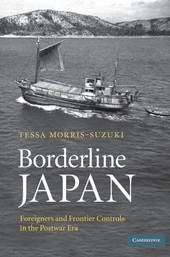
|
Borderline Japan: Foreigners and Frontier Controls in the Postwar Era
Paperback / softback
Main Details
| Title |
Borderline Japan: Foreigners and Frontier Controls in the Postwar Era
|
| Authors and Contributors |
By (author) Tessa Morris-Suzuki
|
| Physical Properties |
| Format:Paperback / softback | | Pages:286 | | Dimensions(mm): Height 229,Width 152 |
|
| Category/Genre | Asian and Middle Eastern history |
|---|
| ISBN/Barcode |
9780521683104
|
| Classifications | Dewey:325.52 |
|---|
| Audience | | Tertiary Education (US: College) | |
|---|
| Illustrations |
Worked examples or Exercises
|
|
Publishing Details |
| Publisher |
Cambridge University Press
|
| Imprint |
Cambridge University Press
|
| Publication Date |
12 January 2012 |
| Publication Country |
United Kingdom
|
Description
This book offers a radical reinterpretation of postwar Japan's policies towards immigrants and foreign residents. Drawing on a wealth of historical material, Tessa Morris-Suzuki shows how the Cold War played a decisive role in shaping Japan's migration controls. She explores the little-known world of the thousands of Korean 'boat people' who entered Japan in the immediate postwar period, focuses attention on the US military service people and their families and employees, and also takes readers behind the walls of Japan's notorious Omura migrant detention centre, and into the lives of Koreans who opted to leave Japan in search of a better future in communist North Korea. This book offers a fascinating contrast to traditional images of postwar Japan and sheds light on the origins and the dilemmas of migration policy in twenty-first century Japan.
Reviews"Unlike much academic writing, Tessa Morris-Suzuki's work is almost always clearly written and jargon-free, impeccably researched and, above all, original... Morris-Suzuki's writing is consistently innovative and thought-provoking. Her new work, Borderline Japan, is no exception...Morris-Suzuki's book should not only be considered required reading for Japanese Studies scholars and students, but for all Japanese who are unaware of the circumstances and sufferings of non-Japanese, the vast majority of whom wanted and continue to want nothing more than to peacefully work and live in-and travel in and out of-a country they have come to call home." -Chris Burgess, Tsuda College, Pacific Affairs
|